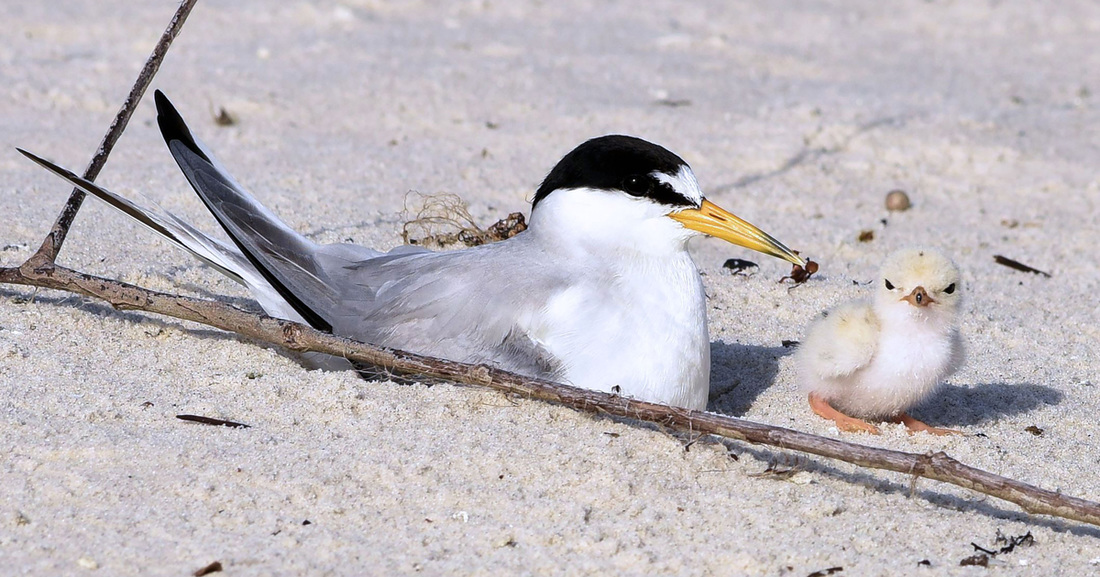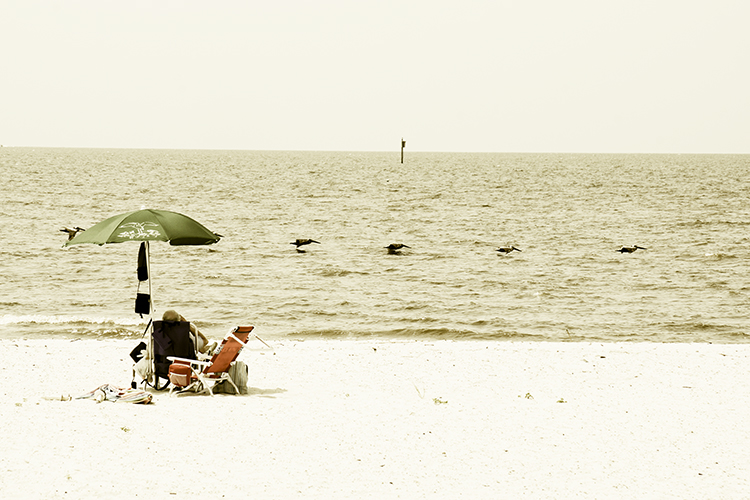Guardians of the Terns
Audubon Mississippi's Bird Stewardship program offers volunteering opportunities year round - including protecting tiny Tern hatchlings during busy beach weekends.
- story by Ellis Anderson, bird photography by Charles Hubbard
Rosanna points out several of the terns dive bombing a family walking ahead of her on the beach path, one of the nesting ground “borders.” The parents and kids are talking and don’t even notice the birds swooping above them. Although they might soon. One of the terns’ defensive mechanisms is pooping on intruders.
“Most people coming to this part of the beach don’t know that it’s a nesting ground,” Rosanna says. “There are roped off areas and signs posted, but they’re having fun and not paying attention. Lots of times they just walk right past the warnings.” “That’s why volunteers are posted on either side of the nesting grounds. Once people understand, they don’t mind a little detour at all.” Least Terns likely spend the winters in Central America, northern South America, and the Caribbean, then return to the Mississippi Coast every April to breed. The birds gather in small colonies along the coastline. At first, couples court while gliding in the air. Then males bring the females tempting morsels of fresh fish to seal the relationship. Once the female’s been won over and they’ve mated, both birds share in parenting responsibilities. Couples hollow out indentations in the beach sand and then announce that it’s home by laying one to three eggs. While herons and raccoons and storm tides are all commonplace factors that can wipe out the hatchlings in a heartbeat, the threat that now requires volunteer help is the growing human population of the Mississippi Coast. Most damage from humans is inadvertent. Beach-goers walking along near the waterline may not notice the roped-off nesting grounds and pass the colony’s unmarked border. They may be oblivious to the alarm they’re causing as the little adults swoop and cry overhead. Unaware, they tromp through the nesting grounds, crushing nests and eggs and even featherless fledglings. Sarah Pacyna, director of the Coastal Bird Stewardship Program, says that human disturbance can flush the adult terns, leaving the eggs and chicks vulnerable to high heat, sun and predators, which include other bird species.
Holiday weekends, like the Fourth of July can be especially bad. In the first of July, the eggs are just beginning to hatch. People crowd the beaches and fireworks must seem like bomb attacks to the nesting colonies.
Audubon’s Least Tern volunteers are trained to politely engage and educate people who are about to absently walk into a nesting area. While the deBuys, who live between New Orleans and Bay St. Louis, are relatively new to the birding word, Waveland resident Barbara Bowen has been an avid birder for over twenty years. She’s a veteran Audubon volunteer. Bowen says it’s a particularly satisfying job. “We’re protecting those little hatchlings, that are so vulnerable now,” she says. “And we get to talk to groups of people and tell them about the terns. They become more aware of the terns, and start appreciating other birds more too.” Roseanna says she and her husband enjoy watching the antics of the birds and sharing information about the birds with new people. “The kids' eyes always light up when we show them the pictures of the chicks,” she says. “Besides, it’s a great excuse to hang out on the beach. It’s peaceful, the scenery is gorgeous and we come away relaxed. It’s a tough volunteer job, but somebody’s got to do it,” she says, laughing. The nesting cycle for the Least Terns comes to a close in August, however, the local Audubon’s Coastal Bird Stewardship Program offers year-round educational and volunteer opportunities. For more information, email Amanda Odom, Volunteer Manager or call (228) 285-0449. Find out the many different ways volunteers can make a difference here! Comments are closed.
|
Categories
All
Archives
July 2024
|
Shoofly Magazine Partners
Our Shoofly Partners are local businesses and organizations who share our mission to enrich community life in Bay St. Louis, Waveland, Diamondhead and Pass Christian. These are limited in number to maximize visibility. Email us now to become a Shoofly Partner!





























 RSS Feed
RSS Feed























